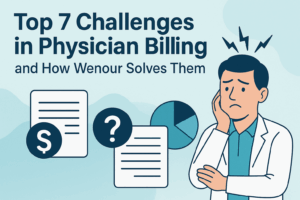Revenue leakage in medical billing can be a major headache for healthcare providers. It occurs when insurance reimbursement is not received for services rendered, leading to unpaid accounts receivable and financial strain. To keep your practice running smoothly, it’s crucial to address and reduce revenue leakage. In this article, we’ll explore seven effective ways to tackle this issue.
Verify Insurance Coverage
One of the key causes of revenue leakage is not confirming insurance coverage before providing services. A patient may not have active insurance or may need alternate coverage. By conducting eligibility and benefits verification, you can ensure that the patient has active coverage and identify any prior authorization requirements. This step provides the assurance that you will be reimbursed for the services delivered.
But hey, who needs assurance, right? Just bill away and cross your fingers that the insurance company will magically pay you. Who needs money, anyway?
Improving Documentation
Another way to reduce revenue leakage is by improving documentation practices. Complete and accurate patient information is essential for successful billing. Implementing Electronic Health Records (EHR) can make this process smoother and more efficient. Properly documenting the services provided and including detailed, specific diagnosis codes also helps strengthen your case for reimbursement. After all, who wants to play a guessing game with insurance companies about the services they should be paying for?
Streamlining Claims Submission
Submitting claims promptly is vital to minimize revenue leakage. The sooner you can get those claims out the door, the better. Automating the claim submission process, monitoring claim status, and following up on claims are all essential steps to ensure reimbursement. Don’t forget, though, patience is a virtue. Just keep waiting for that payment to magically appear in your bank account.
Train and Educate Billing Staff
Investing in coding education for your billing staff is crucial. Certified, specialized coders will ensure accurate and up-to-date coding practices that comply with payer guidelines. Providing ongoing training on billing processes and keeping your staff updated with coding changes is equally important. Who needs outdated knowledge when it comes to getting paid?
Minimize Coding Errors
Coding errors can lead to significant revenue leakage. Utilize certified, specialized coders who understand your medical specialty and stay updated with coding guidelines. Implement regular coding audits to catch any errors and ensure compliance. Remember, coding inaccurately is like speaking a different language to insurance companies. They won’t understand a word you’re saying, and you won’t get paid.
Implement Effective Denial Management
Even with all the right processes in place, denials can still happen. Implementing a proactive denial management strategy is crucial to reduce revenue leakage. Analyzing denial trends, appealing denials effectively, and minimizing rejections through proper documentation are key steps in this process. Who knew that dealing with denials could be so thrilling?
Improve Documentation
Documentation plays a crucial role in reducing revenue leakage in medical billing. By ensuring complete and accurate patient information, healthcare practices can avoid costly billing errors and denials. Plus, it’s always fun to play detective and track down missing pieces of the puzzle!
First and foremost, make sure to collect all relevant patient demographics and insurance information upfront. Who needs surprise presents? The last thing you want is to rely on a carrier pigeon to find out your patient’s coverage. Oh, the joys of modern technology!
Implementing Electronic Health Records (EHR) is another smart move. Say goodbye to the days of searching for that elusive paper chart. With EHR, you can easily access patient records, track services provided, and identify any missing documentation. It’s like having a personal assistant without the latte runs!
When documenting services provided, be as thorough as possible. Don’t be tempted to take shortcuts like leaving out important details. Remember, insurance companies aren’t mind readers! They need to know what specific services were performed, so be sure to note down everything. A little too much information never hurt anyone, right?
And last but certainly not least, include detailed and specific diagnosis codes. No one wants to play a guessing game when it comes to medical billing. By providing accurate diagnosis codes, you ensure that insurance companies understand the medical necessity for the services rendered. It’s like handing them a decoder ring, making their job so much easier.
So, there you have it! By improving your documentation practices, you can significantly reduce revenue leakage in medical billing. And who doesn’t want more money in their pocket? *Cha-ching!*
Streamline Claims Submission
Hey there, physician groups! Are you tired of revenue leakage in your medical billing? Well, fret no more because I’ve got some fantastic ways to reduce that leakage and keep those profits flowing. No more unpaid accounts receivable stressing you out! So, let’s dive into the juicy details, shall we?
- Submit Claims Promptly:
You snooze, you lose! Your billing team should be on top of their game and submit those insurance claims as soon as possible. Ideally, within 24 hours of the patient visit. Don’t keep the insurance companies waiting because they might just delay or refuse payments if you’re not credentialed and enrolled with them. And trust me, you don’t want that!
- Automate Claim Submission Process:
Let’s face it, manual work is so yesterday. Automating your claim submission process is the way to go. It saves time, reduces errors, and ensures that your claims are getting the attention they deserve. Plus, it’s a great way to keep your billing team sane and happy. No more chasing after paperwork or getting buried under piles of claims. Thank you, automation!
- Monitor Claim Status:
Don’t just submit those claims and forget about them. Be a responsible biller and keep tabs on their progress. Stay updated on the status of each claim to ensure they’re moving forward smoothly. And if there are any hiccups along the way, nip them in the bud!
- Follow Up on Claims:
Hey, did you think submitting a claim was the end of the road? Oh no, my friend! Follow up is crucial. Sometimes, claims can get lost in the abyss of bureaucracy, so it’s up to you to bring them back into the light. Follow up with the insurance companies and make sure they’re processing your claims in a timely manner. Don’t let them slip through the cracks!
Now, before we wrap up this riveting discussion, let me remind you that reducing revenue leakage requires constant vigilance and a rock-solid billing team. So, train and educate your staff to handle coding like a pro, implement effective denial management strategies, and improve your documentation.
And remember, don’t stress about all this. You can always turn to the experts at wenour for transparent RCM services that will keep your revenue flowing steadily. So, why wait? Contact us today and wave goodbye to revenue leakage!
Train and Educate Billing Staff
When it comes to reducing revenue leakage in medical billing, one of the most crucial factors is having a well-trained and knowledgeable billing staff. You definitely don’t want your billing team to be a bunch of amateurs messing up your revenue cycle, do you? Of course not!
So, here are some key points to consider when it comes to training and educating your billing staff:
Invest in Coding Education: It’s time to put your money where your mouth is and invest in proper coding education for your staff. Don’t expect them to magically become coding experts overnight. Provide them with the necessary resources and training to enhance their coding skills. After all, accuracy in coding is a major contributor to revenue leakage.
Keep Staff Updated with Coding Changes: Coding guidelines are not set in stone; they change frequently. Your staff needs to stay on top of these changes to ensure that they are always using the latest codes and complying with insurance company and state requirements. Keep them informed about any coding updates and provide them with regular training sessions to brush up their coding knowledge.
Provide Ongoing Training on Billing Processes: Billing is not just about coding; there is a whole process involved. From claim submission to follow-up on claims, your staff needs to be well-versed in all aspects of billing. Conduct regular training sessions to keep them updated on the latest billing processes and best practices. This will help them identify and rectify any potential sources of revenue leakage.
Ensure Compliance with Payer Guidelines: Payers have their own specific guidelines and requirements that must be followed when submitting claims. Your billing staff should be well aware of these guidelines and trained to adhere to them. Failure to comply with payer guidelines can lead to denied claims and revenue leakage. Train your staff to dot the i’s and cross the t’s to ensure maximum reimbursement.
Remember, a well-trained and educated billing staff is your secret weapon against revenue leakage. So, invest in their knowledge and skills, keep them updated with the latest coding changes, provide ongoing training on billing processes, and ensure compliance with payer guidelines. With a competent billing team by your side, revenue leakage will be a thing of the past.
Minimize Coding Errors
Ah, coding errors, the bane of every physician’s existence. One small mistake and suddenly you’re pulling your hair out trying to figure out why your claims keep getting denied. It’s a never-ending cycle of frustration and lost revenue. But fear not! There are ways to minimize these coding errors and save yourself from the headache.
First and foremost, it’s crucial to use certified, specialized coders. These professionals have the knowledge and expertise to navigate the ever-changing coding guidelines. They eat, breathe, and dream about coding, so you can trust them to get it right. Plus, they’ll probably make some pretty cool coding jokes along the way.
But it doesn’t stop there. Staying updated with coding guidelines is essential. And no, I don’t mean scrolling through endless textbooks like a sleep-deprived medical student. Embrace technology, my friends! There are plenty of online resources and software tools that can keep you in the loop with the latest coding updates. It’s like having your own personal coding guru, minus the white beard.
Now, let’s dive into the wonderful world of coding audits. You might be thinking, “Ugh, audits? No thank you!” But trust me, they’re worth it. Regular coding audits help identify and correct any coding errors before they turn into a denial nightmare. It’s like having an extra pair of eyes (or two) to ensure everything is shipshape. Plus, it gives you an excuse to bring snacks to the office and bribe your coding team for their hard work.
So, my fellow revenue warriors, let’s minimize those coding errors and keep the revenue flowing smoothly. Remember, certified coders, staying updated, and regular audits are the keys to success. And who knows, you might even find yourself enjoying the world of medical coding. Okay, maybe not, but at least you’ll sleep better knowing your claims are coded accurately. Happy coding!
Implement Effective Denial Management
Dealing with claim denials can be a major headache for healthcare providers. But fear not! With an effective denial management strategy, you can turn those frowns upside down and reduce revenue leakage.
First and foremost, be proactive in your approach. Don’t just wait for denials to happen; take the necessary steps to prevent them. Analyze denial trends to identify common issues and address them upfront. Are there certain procedures or services that consistently get denied? Maybe it’s time to review your documentation or coding practices.
When denials do occur, don’t just accept defeat. Appeal them effectively! Gather all the necessary information, craft a strong argument, and submit a well-documented appeal. Be persistent and don’t give up easily. Remember, every denied claim represents potential revenue that you should fight for.
One way to prevent denials in the first place is through proper documentation. Make sure your staff is trained to document services accurately and thoroughly. Capture all the necessary details and include specific diagnosis codes that support medical necessity. By being diligent in your documentation, you can minimize the chances of denials due to insufficient information.
Reducing rejections is another important aspect of effective denial management. By following proper documentation practices, you can ensure that claims meet all the requirements set by payers. Double-check the accuracy of your claims before submission to avoid unnecessary rejections.
Implementing an effective denial management strategy requires a combination of proactive measures, analysis, effective appeals, and proper documentation. By tackling denials head-on, you can significantly reduce revenue leakage and keep your practice on the path to financial success.
Now, that’s what I call fighting back against revenue leakage! Who said denial management had to be boring? Stay tuned for more exciting tips on reducing revenue leakage in medical billing!
By following these strategies, you’ll be well on your way to maximizing your reimbursements and keeping your practice financially healthy. So go ahead and conquer those billing challenges like the superhero you are!







